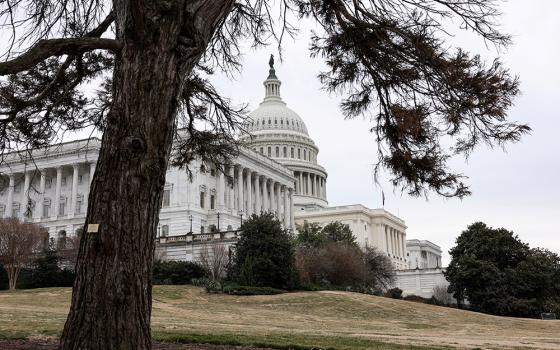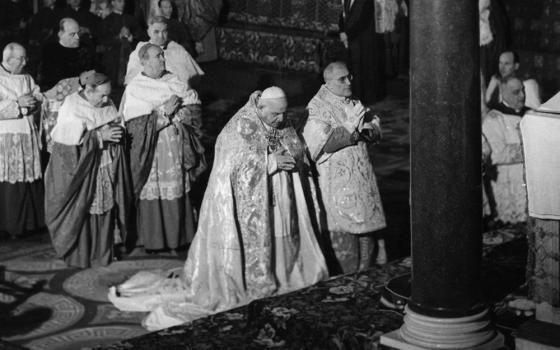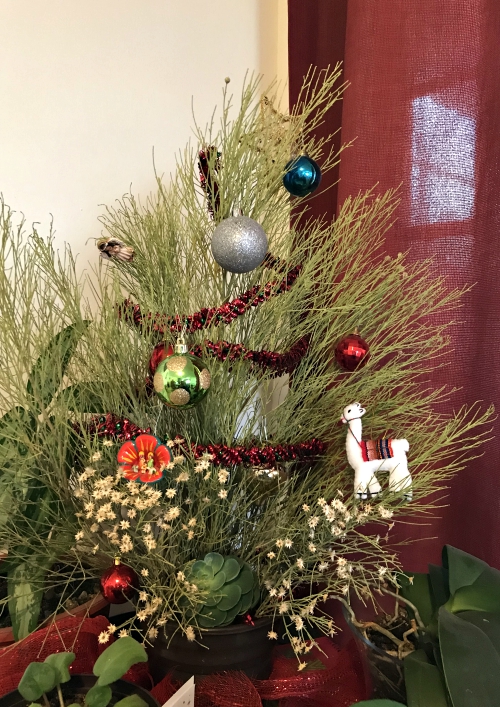
The little "tree" — a branch provided by Sister Tracey's companion (Tracey Horan)
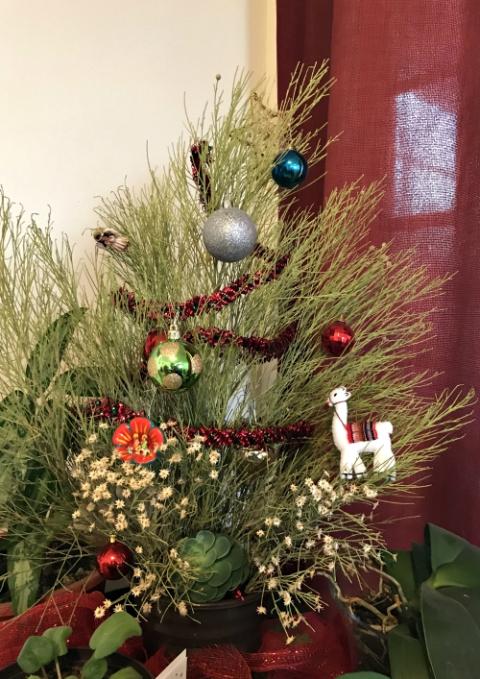
The little "tree" — a branch provided by Sister Tracey's companion (Tracey Horan)
I've been reflecting a lot on home lately. As a Sister of Providence who has lived in 5 different places since I entered community five years ago, the concept of home is a complex one. Just because I live in a place with other sisters doesn't mean it feels like home right away; it's a process. It requires a bit of nesting, bringing my own flavor and meaningful symbols to a place. It requires deepening relationship and quality time.
I've seen that this work of homemaking bears precious fruit. I notice that when I return to a place I lived, even if only for a year or so, that place still holds a piece of home for me. Returning to those places connects me with images, feelings, smells and memories that have shaped me.
Then there are times when I feel at home right away in a new place where I have no connections. I remember feeling this way the first time I set foot in the log cabin chapel on our motherhouse grounds in St. Mary-of-the-Woods, Indiana, where our foundress Mother Theodore first prayed in thanksgiving when she and her companions arrived at their new home. Something about the simplicity and earthiness of the cabin, the wooden altar and rustic cross felt familiar to my spirit.
This has been my first Christmas away from my childhood home. Although I'll be headed to my native Indiana in January, I'd be lying if I said I haven't been emotional about missing out on the foods, traditions and quality time with my family.
I've found some ways to bring a bit of that home to this newer home: setting up a Nativity scene in my room, hanging up the stocking embroidered by my grandma, taking time to decorate the house while blaring Christmas music the way my family would. Although putting up a Christmas tree isn't common practice here in Nogales, my housemate humored me by creating a makeshift tree from some branches she harvested in the field next to our house.
This Christmas will be different. At the same time, there is something deeply sacred and somehow familiar to me about this newness, about being in this place at this time. We hear the story every December: a family seeking refuge, fleeing oppression, traveling with the intention of complying with a public decree, with the hope of finding welcome. The response they find is also familiar: apathy and closed doors.
Advertisement
These days as I witness the fatigue of people worn down by the Remain in Mexico policy and asylum metering, the words of the Advent hymn "Maranatha" (translated here into English) play over and over in my heart:
Oh beloved, rain from above,
Oh clouds, send us the Holy One
Oh earth, open earth!
and sprout the Savior.We are desert, we are sand,
Maranatha, Maranatha;
We are a wind without horizons,
Maranatha, Maranatha.Our darkness does not dissipate,
Maranatha, Maranatha;
Our chains, no one breaks them,
Maranatha, Maranatha.An intense cold paralyzes us,
Maranatha, Maranatha;
We are hungry, nobody nourishes us,
Maranatha, Maranatha."
For me, this song captures an often-ignored tension in the Christmas story. So often we paint the birth of Jesus in rosy, comfortable, holy terms. It is rare that we consider the both/and of the Holy Family's reality: the fear Mary and Joseph must have felt after Jesus' birth, even as they trusted the Holy One was present with them. Their reality had only become more complicated. Now their travels would involve a fragile baby. Any dangers they faced on the journey would be even more dangerous for a vulnerable newborn. There was another life to consider, another mouth to feed. Emmanuel had come to them, and yet they still faced the reality of spending a dark night outside among the animals.
Lately, I have held this tension in my ministry with migrants at the Kino Border Initiative. As in the song "Maranathá," the reality is bleak. Yet it does not stifle the longing, the determined seeking of hearts desperate to give birth to a new existence.
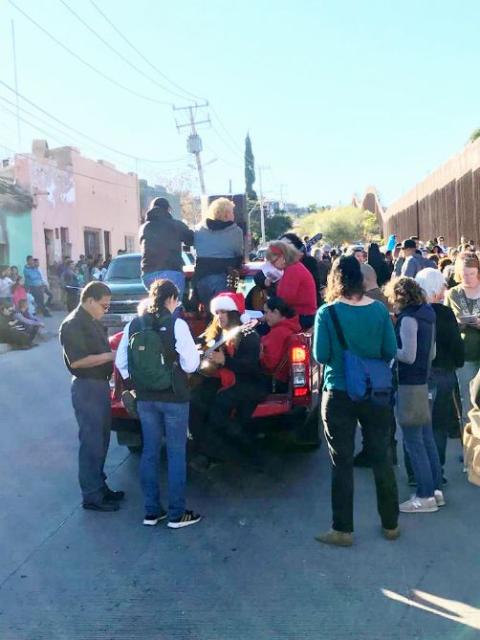
The binational Posadas Procession in Nogales, put on by the Kino Border Initiative and Diocese Without Borders (Tracey Horan)
Earlier this week, a volunteer approached me to talk. I had asked her to give clothes out to some women who had just arrived with their children after being deported. She was in tears: "Tracey, they're deporting children. They're deporting entire families." Her grieving eyes held mine as we looked at each other in silence for a moment. "I know," I said. "It's horrible. There are no words."
Our darkness does not dissipate ... Maranatha, Maranatha.
As our elected leaders chip away at the rights of asylum seekers, detaining them for months, impeding access to legal assistance, sometimes forcing them to wait for hearings in the very country they are fleeing, the Christmas story is made manifest anew. Holy families are being denied hospitality. Since the inception of the Remain in Mexico policy, only 0.1% of families removed from the U.S. to await their asylum hearings in Mexico have been granted asylum. Asylum grant rates are plummeting in general as the federal administration implements new oppressive policies, like refusing asylum applications from people who have not applied for asylum and been denied elsewhere.
Our chains, no one breaks them ... Maranatha, Maranatha.
In Nogales, Sonora, wait times for asylum seekers to be processed are getting longer and longer, especially for families. During some weeks, fewer than 20 families have been processed, of more than 1,000 families on the wait list. This week I talked with a woman from Guerrero, Mexico, as she told me, blinking back tears, that she never thought she would spend Christmas here waiting. She arrived with her two sons and husband to the U.S.-Mexico border in September. She looked around our migrant aid center at the other families bringing their dishes to be washed and cleaning up after the morning meal. "At least we're not alone — we're not the only ones," she said.
Oh beloved, rain from above ... Oh clouds, send us the Holy One.
In the midst of writing this column, grappling with finding home alongside people who have fled their homes and will be spending Christmas stranded in Nogales, I too found myself stranded. More specifically, locked out of our house. The sisters I live with had all left for the Christmas holidays, and the last one had locked the front door as we left to take her to the bus station. It wasn't until I returned home later that night that I realized I had not taken a house key with me. My key was in the well-secured, locked house. Oh no.
I spent the night with Marla, a generous friend and co-worker who took me in, brainstormed ways to get into the house with me, and made some calls. The front lock was designed not to be broken into — no one will be able to open it. Maybe we can find someone to take the door off? A friend of a friend is a welder — maybe he can open one of the windows? Twelve hours later, a kind, burly soul used a crowbar and lots of elbow grease to jar open an ancient sliding door to my room, which had been declared impossible to open in recent history. Praise Jesus! I can't remember ever feeling so jubilant to enter a house. I hugged that welder with reckless abandon.
I was home for Christmas.
As I beheld our little makeshift tree and my belongings with fresh, grateful eyes, I reflected on the experience of breaking through. In 12 hours, Marla and I had found a closed door, felt moments of panic and despair, and at times believed that breaking through was impossible. We also had moments when we encouraged one another: "I have another idea ... Surely there's a way to get in ... Let's get some rest and come back in the morning ... Everything's going to be OK ..."
As we marvel together at the impossible breaking through of God-With-Us in the Child Jesus, and as I marvel at a newly opened door to a warm house, I pray we might echo this breaking through in the face of injustice. May this process of determined seeking, communal creativity and miraculous breaking through inform our resistance to oppressive policies that refuse welcome to migrants. As we face closed doors, may we tirelessly seek other ways in. In our fatigue and distress, may we celebrate with reckless abandon the doors that do open.
And as we work and pray, may we trust that the prophet Isaiah's words will come to fruition: "My people will live in peaceful country, in secure dwellings and quiet resting places."
Maranatha. Maranatha.
[Tracey Horan is a member of the Sisters of Providence of St. Mary-of-the-Woods, Indiana. She is the education coordinator at the Kino Border Initiative in Nogales, Arizona, and Sonora, Mexico.]





